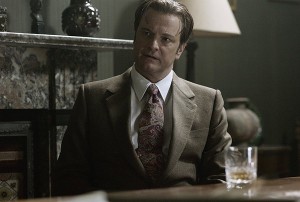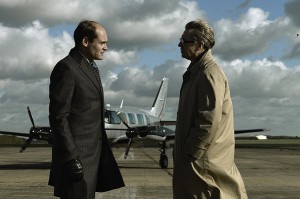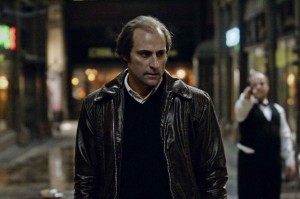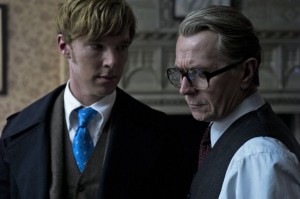
Tomas Alfredson’s Tinker Tailor Soldier Spy—adapted from John le Carré‘s novel—may not be snowbound like his Let the Right One In (2008), but it’s very nearly as chilly. It’s also just as good in its own right—and with occasional elements that would not be out of place in a horror film. That said, three things need to be understood before watching this film. First of all, this is not an action thriller. The thrills are more cerebral in nature, so don’t expect explosions to be the coin of the realm—this isn’t James Bond. Second, this is not a film for people who aren’t prepared to actually pay attention to what they’re watching—and to what they’re hearing. Third, this isn’t a version of the book that tries to slavishly reproduce every page—you’ll find something more like that with the 1979 seven-part BBC series, if that’s what you’re after. As a self-contained work, however, this is the goods.

I am not about to attempt to lay out the plot of the film beyond its basic premise, because it’s far too complicated and convoluted. Also, it’s the sort of film best left to the actual experience of viewing, not to telling. It’s a Cold War-era story set in 1973 that finds the head of MI6—known as Control (John Hurt)—convinced that there is a Russian mole “right at the top of the Circus”—in other words, highly placed in the secret council. But before he can get very far in his investigations, an espionage bid goes wrong and both Control and his right-hand man George Smiley (Gary Oldman) are put out to pasture. Soon, however, Control is dead and Smiley has been called out of “retirement” to learn the identity of the mole. In simple terms, that’s the story, but simple terms don’t begin to explain the drama.

Tinker Tailor Soldier Spy is a story of loyalties and of the intertwined—and far from exemplary—lives of the men in the British secret service. Personal clashes and personalities—not to mention egos and secrets within secrets—are at the core of the story. Everyone has weaknesses and everyone has his own agenda. The brilliance of the film lies in the way it reveals these things in not only a series of investigations, but in flashbacks. Much is conveyed in what at first may seem like throwaway scenes, requiring the viewer to truly pay attention to follow the story, but that effort is amply rewarded over the course of the film. It’s also a fitting approach, since the viewer is no better off than Smiley himself as the story unfolds.
What you end up with is an espionage thriller that is in large part a series of character studies. Much of the film depends on the performances of its handpicked cast—Colin Firth, Toby Jones, Ciarán Hinds, Mark Strong, Benedict Cumberbatch, Tom Hardy, John Hurt and Gary Oldman. At the top of this list is Oldman, who hasn’t had a role this good in ages—and it’s more than a little ironic that this role should come his way in the same year he was in the embarrassingly bad Red Riding Hood.

The film’s Cold War setting is part of what makes it work, just as the lack of that setting is part of what feels slightly bogus about the more recent James Bond movies. It inescapably recalls the more intelligent 1960s spy films; the Harry Palmer series, with its webs of corruption and characters with hidden agendas, comes to mind. (It also shares some of those films’ dry humor, and makes one pointed reference to 1960s cinematic style with a process-work shot of characters “riding” in a Citroën.) But Alfredson’s film eschews even the marginal heroics and big set-pieces of those films in favor of an utterly matter-of-fact reality. In turn, this approach makes the proceedings all the more unsettling—to the point of nightmarish on occasion. These accomplishments make the film one of the best things to come out of 2011. Rated R for for violence, some sexuality/nudity and language.




Oldman described the table read of this as ‘Six degrees of Harry Potter’.
It’s probably harder to be a member of Actor’s Equity and not have been in a Harry Potter movie than to have been in one.
Bear in mind that this is very different from the BBC version and that Firth is not the lead, though he does have a substantial supporting role.
I will keep it in mind, and only increases my interest in seeing it. As for Colin Firth, it is not necessary for him to be in the lead role. For example, while only one of an ensemble cast in Love Actually, he darned near stole the show. Now I also like Gary Oldman in most of his performances (an exception was The Professional…it was too outlandish and over-the-top), so clearly there is a lot of talent in this film.
Well, I really enjoyed the BBC production, so I am looking forward to this adaptation as well. Plus I’m a Colin Firth fan.
If you want to see Oldman at his worst (and it’s hard to blame him, given the material) check out Red Riding Hood. It’s interesting that if Love Actually has a star role, it’s probably Hugh Grant, but Firth is who I think of first when I think of the film.
Bear in mind, I got paid to sit through Red Riding Hood, you wouldn’t.
I understand; however, having seen some films (too many, really) that I found a waste of time (or close to it), in hindsight, I should have been paid just to endure them. Having read your review of Red Riding Hood (as well as others’ reviews), it would fall into that category.
Back to Colin Firth, I was really unaware that he has made as many films as he has, until I did a IMDB search. In fact, I noted films of his that I’ve seen but didn’t recall him being in (among them ‘Conspiracy’, about the Wannsee Conference, which I think I’ll re-watch soon as I have the DVD). Perhaps it was only due to films like Love Actually, A Single Man and The King’s Speech that I really started paying attention to his other roles (okay, I also liked him in the otherwise fluff teenage-oriented film What A Girl Wants).
As for Oldman, I first became aware of him in his show-stealing turn in State of Grace.
“If you want to see Oldman at his worst (and itТs hard to blame him, given the material) check out Red Riding Hood.”
That’s awfully tempting, but I have more worthwhile things to do with 90 minutes, such as cleaning raccoon dung off my porch.
having seen some films (too many, really) that I found a waste of time (or close to it), in hindsight, I should have been paid just to endure them.
Hey, I’m still hoping the paper will See The Error of Their Ways and pay me for two movies for 4 hours of Gods and Generals. But since that was about 10 years ago, I don’t hold out much hope.
It’s interesting that if Love Actually has a star role, it’s probably Hugh Grant, but Firth is who I think of first when I think of the film.
What, not Bill Nighy? Disgraceful.
Well, he’s certainly memorable.
Just when I thought Gary Oldman couldn’t seem any cooler, I watched this. Hot damn.
This just hits every note in perfect pitch. I’m a big Le Carre fan and they couldn’t have done him any more justice.
And if this doesn’t walk off with the production and costume design Oscars this year, I will be distraught.
I just finished re-watching the Alec Guiness version – can’t wait to see Oldman in that role.
The funny thing is that both of them modeled their performances on Le Carre.